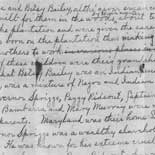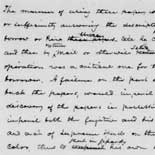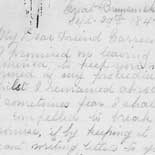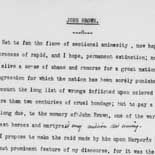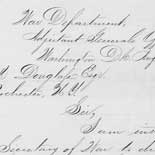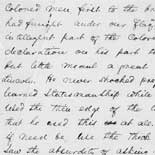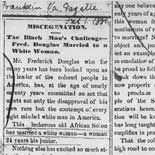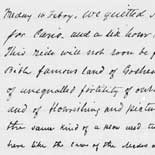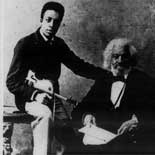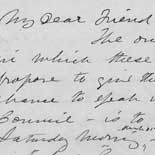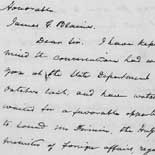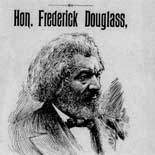Overview
The Frederick Douglass Papers at the Library of Congress presents the papers of the nineteenth-century African American abolitionist who escaped from slavery and then risked his freedom by becoming an outspoken antislavery lecturer, writer, and publisher. The online collection, containing approximately 7,400 items (38,000 images), spans the years 1841-1964, with the bulk of the material dating from 1862 to 1865. Many of Douglass’s earlier writings were destroyed when his house in Rochester, New York, burned in 1872.
The collection is organized in the following series:
- Diary. A single diary that Douglass kept during his tour of Europe and Africa, 1886-87.
- Family Papers. A highlight is the biography of Anna Murray Douglass, Frederick Douglass’s wife of forty-four years, written by their daughter, Rosetta Douglass Sprague.
- General Correspondence. Includes letters Douglass received from prominent reformers and politicians, including Susan B. Anthony, Grover Cleveland, William Lloyd Garrison, Benjamin Harrison, Russell Lant, Gerrit Smith, and Ida B. Wells.
- Subject File. Reveals Douglass’s interests in diverse subjects such as politics, racial prejudice, and prison reform.
- Speech, Article and Book File. Contains the writings of Douglass and his contemporaries in the abolitionist and women’s rights movements and includes autographed copies of editorials and opinion pieces from Douglass’ antislavery weekly, North Star, and a partial handwritten draft of Douglass’s third autobiography, The Life and Times of Frederick Douglass.
- Financial Papers. Includes bank books, receipts, checks, ledgers, contracts, stocks and bonds, and insurance policies.
- Legal File. Holds wills, deeds, mortgages, copyrights, lawsuits, and miscellaneous legal documents.
- Miscellany. Includes newspaper clippings and photographs.
- Addition I. Includes scrapbooks that document Douglass’s role as minister to Haiti and the controversy surrounding his interracial second marriage.
The Frederick Douglass Papers were originally in the library at Cedar Hill, Douglass’s home in Anacostia, Washington, D.C., from 1878 until his death in1895. In 1900 Helen Pitts Douglass, Douglass’s second wife, established the Frederick Douglass Memorial and Historical Association so that the home and its contents might be maintained after her death. The association held the property from 1903 until 1916, when it joined forces with the National Association of Colored Women’s Clubs. In 1962 Congress declared Cedar Hill a national historical site, and ownership of the home and its contents was transferred to the National Park Service.
The National Park Service transferred the Frederick Douglass Papers to the Library of Congress between 1972 and 1974 to ensure their proper custodial care and to make them more readily accessible to researchers. In 1975 additional Douglass materials were acquired by the Library of Congress and added to the Frederick Douglass Papers as the Addition I Series. The papers were microfilmed and made available to the public. The online Frederick Douglass Papers at the Library of Congress has been digitally scanned from a thirty-four-reel microfilm set. Since the microfilming was performed, additional materials have been received; they are currently contained in the Addition II Series. These new materials have not been microfilmed and are not included yet in this online collection.
Frederick Douglass documented many instances of racial prejudice and violence in his papers. Therefore, some of the materials in this online historical collection contain language or negative stereotypes that may be offensive to some readers.
Rights And Access
The Library of Congress provides access to The Frederick Douglass Papers at the Library of Congress for educational and research purposes and makes no warranty with regard to their use for other purposes. Responsibility for making an independent legal assessment of an item and securing any necessary permissions ultimately rests with persons desiring to use the item. The written permission of the copyright owners and/or holders of other rights (such as publicity and/or privacy rights) is required for distribution, reproduction, or other use of protected items beyond that allowed by fair use or other statutory exemptions. There may be content that is protected under the copyright or neighboring-rights laws of other nations.
Credit Line: Library of Congress, Manuscript Division
Letter, Henry O. Tanner to Frederick Douglass, May 7, 1894, made available here with permission from Dr. Rae Alexander-Minter.
Expert Resources
- Finding Aid For The Frederick Douglass Papers
- Frederick Douglass National Historic Site
- Frederick Douglass Papers Project, Indiana University And Purdue University
- From Slavery To Freedom: The African-American Pamphlet Collection, 1822-1909. Washington, D.C. American Memory Project, Library Of Congress, 2000.
- Frederick Douglass National Historic Site
- Manuscript Division Reading Room
